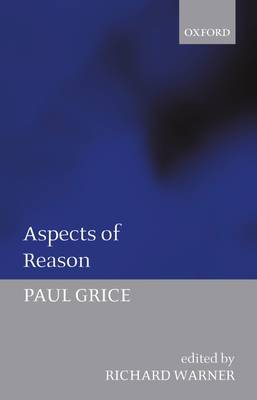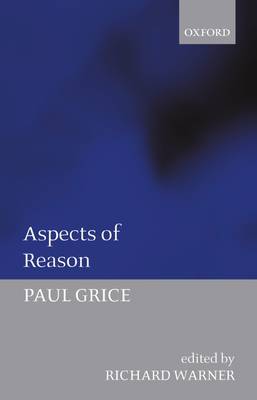
- Afhalen na 1 uur in een winkel met voorraad
- Gratis thuislevering in België vanaf € 30
- Ruim aanbod met 7 miljoen producten
- Afhalen na 1 uur in een winkel met voorraad
- Gratis thuislevering in België vanaf € 30
- Ruim aanbod met 7 miljoen producten
Zoeken
Omschrijving
Reasons and reasoning were central to the work of Paul Grice, one of the most influential and admired philosophers of the late twentieth century. In the John Locke Lectures that Grice delivered in Oxford at the end of the 1970s, he set out his fundamental thoughts about these topics; Aspects of Reason is the long-awaited publication of those lectures. They focus on an investigation of practical necessity, as Grice contends that practical necessities are established by derivation; they are necessary because they are derivable. This work sets this claim in the context of an account of reasons and reasoning, allowing Grice to defend his treatment of necessity against obvious objections and revealing how the construction of explicit derivations can play a central role in explaining and justifying thought and action. Grice was still working on Aspects of Reason during the last years of his life, and although unpolished, the book provides an intimate glimpse into the workings of his mind and will refresh and illuminate many areas of contemporary philosophy.
Specificaties
Betrokkenen
- Auteur(s):
- Uitgeverij:
Inhoud
- Aantal bladzijden:
- 176
- Taal:
- Engels
Eigenschappen
- Productcode (EAN):
- 9780199278435
- Verschijningsdatum:
- 24/03/2005
- Uitvoering:
- Paperback
- Formaat:
- Trade paperback (VS)
- Afmetingen:
- 180 mm x 217 mm
- Gewicht:
- 231 g

Alleen bij Standaard Boekhandel
+ 219 punten op je klantenkaart van Standaard Boekhandel
Beoordelingen
We publiceren alleen reviews die voldoen aan de voorwaarden voor reviews. Bekijk onze voorwaarden voor reviews.











